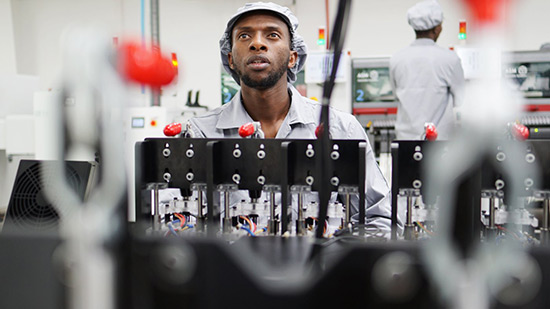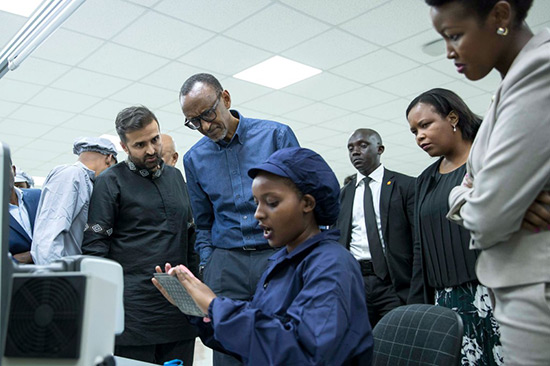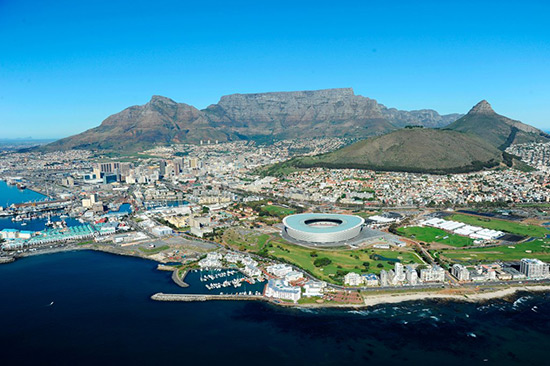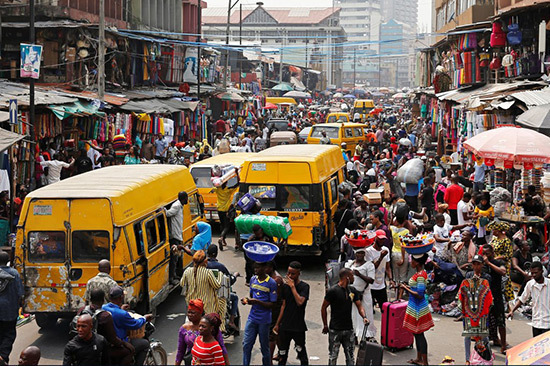非洲硅谷诞生记

|
去年10月,当第一座“非洲制造”手机工厂出现在卢旺达首都基加利时,它带来的不光是意外——该厂的产品还搭载了用于屏幕解锁的指纹传感器等高端设备,而目前非洲大陆普遍使用的其他手机还不具备这样的功能。 它提升的不仅是非洲科技,还有非洲质量。 这座工厂属于卢旺达公司Mara Group,是基加利的一个重要里程碑。这座城市花了几十年时间从1994年的种族大屠杀中重生,继而成为一个科技枢纽。它已经设立了几个科技公司孵化器、卡内基梅隆大学的一所工程学院以及一些初创公司,其产品包括无人机和无现金支付系统。 卢旺达科技部部长宝拉·因加比莱说:“这要归结于我们动荡的过去,什么也没有留下,而我们用灰烬作为团结的建设工具。” 受贫困、奴隶贸易和殖民主义的遗留问题影响,非洲直到最近仍然被排除在全球科技热潮之外。但这片大陆正越来越成功地孕育出科技初创企业,并且引进了大型的外国科技公司。 去年11月,Visa向尼日利亚支付公司Interswitch投资2亿美元。几乎同期,隶属于一家挪威公司但总部设在拉各斯的移动支付服务商OPay融资1.2亿美元,投资者包括红杉资本和软银亚洲风投等知名机构。2019年5月,微软在肯尼亚和尼日利亚设立办事处,供工程师在人工智能、机器学习和混合现实领域开展工作。而一个月前,谷歌在加纳建立了一处人工智能实验室。 推特及支付终端制造商Square的首席执行官杰克·多尔西于去年11月在推特上表示,2020年他将在非洲逗留六个月。多尔西说:“非洲将定义未来。” 不过,非洲正在成长的科技行业体量依然很小,而且在许多方面都受到一些非常明显的现实问题制约。近6亿非洲人无电可用,包括撒哈拉以南三分之二的人口,而且85%的非洲居民的日均生活开支还不到5.5美元(人民币38.3元)。 无论设在何地,初创公司总会不可避免地遇到经营问题,而这让上述挑战变得更加复杂。举例来说,尼日利亚的在线零售商Jumia Technologies于去年4月成为第一家在纽约证券交易所上市的非洲科技公司,但它最近关闭了坦桑尼亚和喀麦隆的电商业务以及卢旺达的食品快递服务。截至去年12月中旬,该公司的股价已经从最高点下滑87%。 好的一面是风投资金渠道不断拓宽。2018年,投资者向非洲的初创企业投入了12亿美元资金,是两年前的三倍以上。 非洲的新加坡 在所有涉足科技领域的非洲国家中,卢旺达最为出色。这个多山国家有1200万人,面积和美国的马里兰州差不多。卢旺达的科技行业集中在被世界经济论坛誉为“全球最干净城市”的基加利。 卢旺达对科技的推动已经吸引了拉各斯设计实验室Co-Creation Hub、斯德哥尔摩共享办公及投资基金Norrsken以及卡内基梅隆大学,后者于2011年在卢旺达设立了可以容纳300名毕业生的学院,又在去年11月进行了升级。 长期以来,卢旺达总统保罗·卡加梅一直表示他的目标是让卢旺达成为非洲的新加坡。但卢旺达更像是非洲的爱沙尼亚——对欧洲蓬勃发展的科技行业来说,爱沙尼亚是强大而实用的后端“机器”。 卢旺达向科技公司毛遂自荐的理由之一是它没有繁琐的行政程序。世界银行的数据显示,卢旺达的营商便利程度居全球第38位,在非洲国家中排名榜首,而且超过了荷兰(42位)、印度(63位)和巴西(124位);美国排在第6位。 虽然按照西方标准,卢旺达的政治自由度仍然有限,但其社会一直在进步。例如,61%的国会议员为女性,占比居全球首位。2017年,卢旺达将斯瓦希里语定为官方语言之一,目的是更好地与邻国融合。 无论卢旺达做什么,显然都在获得回报。去年11月,国际货币基金组织将卢旺达2019年经济增速预期上调至8.5%的高点,而此前7.8%的增长预期已经较为强劲。 1996年成立的Mara Group正在设法利用卢旺达经济的快速发展以及非洲很大一部分地区的类似成就。该公司有两款安卓智能手机——基本款定价159美元,高端款定价229美元,意图与韩国三星以及中国华为和传音的较便宜机型相抗衡。 |
When a factory in Rwanda’s capital of Kigali debuted Africa’s first made-in-Africa mobile phones in last October, their provenance wasn’t the only surprise: The devices also came loaded with higher-end features like fingerprint sensors for unlocking the screen that many rival phones used across the continent lack. It wasn’t just a push for African tech but also for African quality. The factory, owned by Rwandan company Mara Group, was a major milestone for Kigali, which has spent a generation emerging from the ashes of the nation’s genocide in 1994 by refashioning itself as a tech hub. Already, the city is home to several tech incubators, a Car¬negie Mellon University engineering campus, and local startups that produce such items as drones and cashless payment systems. “It boils down to our turbulent past, being left with nothing, and using ashes as a construction tool for unity,” says Paula Ingabire, Rwanda’s tech minister. Hamstrung by poverty and the legacies of the slave trade and colonialism, Africa had, until recently, been left largely behind by the global tech boom. But increasingly, it’s having success nurturing tech startups and attracting major foreign tech companies. In last November, Visa invested $200 million in Nigerian payments firm Interswitch at around the same time that OPay, a Norwegian-owned but Lagos-based mobile payment service, raised $120 million from high-profile investors including Sequoia Capital China and SoftBank Ventures Asia. Meanwhile, in May, Microsoft opened offices in Kenya and Nigeria for engineers working on artificial intelligence, machine learning, and mixed reality. A month earlier, Google opened an A.I. lab in Ghana. In another sign of Africa’s growing tech buzz, Jack Dorsey, CEO of Twitter and payment-terminal maker Square, tweeted in last November that he would spend up to six months in 2020 living on the continent. “Africa will define the future,” he said. Still, Africa’s growing tech scene remains small and, in many ways, limited by some very stark realities on the ground. Nearly 600 million Africans lack electricity, including as many as two-thirds of sub-Saharans, and 85% of the continent’s residents live on less than $5.50 a day. Such challenges are compounded by the inevitable operational problems that all startups face, regardless of their location. For example, Nigerian online retailer Jumia Technologies, which in last April became Africa’s first tech company to hold an initial public offering on the New York Stock Exchange, recently shuttered its e-commerce operations in Tanzania and Cameroon, along with its food delivery service in Rwanda. As of mid-December, its shares had plummeted nearly 87% from their peak. On the bright side, access to venture capital is growing. Investors poured $1.2 billion into African startups in 2018, more than triple the amount of two years earlier. Of all the African countries pushing into tech, Rwanda stands out. A hilly nation of 12 million that’s similar in size to Maryland, its effort is centered on Kigali, named “world’s cleanest city” by the World Economic Forum. The drive has already attracted Co-Creation Hub, a design lab from Lagos; Norrsken, a coworking space and investment fund from Stockholm; and Carnegie Mellon University, which opened its campus for 300 graduate students in 2011 and upgraded to a new campus in last November. African Singapore Rwandan President Paul Kagame has long said that his goal is to make Rwanda an African Singapore. But it has become more of an African Estonia, the powerful, practical back-end workhorse of Europe’s burgeoning tech scene. Part of Rwanda’s sales pitch to tech companies is its lack of red tape. The country ranks 38th in terms of ease of doing business, according to the World Bank, the best ranking in continental Africa and ahead of the Netherlands (42), India (63), and Brazil (124); the U.S. is sixth. While political freedoms in the country are constrained by Western standards, social progress has piggybacked Rwanda’s social development (its parliament is 61% women, the highest percentage in the world). In 2017, the country embraced Swahili as an official language—to better integrate with its neighbors. Whatever Rwanda is doing, it appears to be paying off. In last November, the International Monetary Fund revised its growth forecast for the country in 2019 to a zippy 8.5%, up from an already strong 7.8%. Mara Group, founded in 1996, is trying to capitalize on Rwanda’s rapid economic development and, for that matter, the similar gains taking place across much of Africa. The company’s two Android smartphones—$159 for the basic version and $229 for the higher-end one—compete mostly against cheaper models from Samsung and Chinese phonemakers Huawei and Transsion. phonemakers Huawei and Transsion. |

|
Mara Group的首席执行官阿西什·塔卡尔说:“没错,进口的更便宜。但如果我们这么想,那就永远也造不出任何东西。你必须得去创造,因为‘复制-粘贴’模式意味着你在粘贴时已经落后好几年了。” 除了在基加利设立有200多名员工的工厂,Mara Group还在南非建了厂,并且正在考虑赴尼日利亚设立第三座工厂。 塔卡尔拒绝透露Mara的手机销量,他只表示该公司的产品已经进入46个国家和地区,包括欧洲和美国。 软件开发公司Awesomity Lab的首席执行官莱昂内尔·姆非兹刚刚参加完里斯本的网络峰会,他认为基加利的创业特征是迅捷。有着“超棒队长”非正式称号的姆非兹说:“在这儿用六个小时就能开一家公司。种族大屠杀以来,我们已经有了长足进步,进行了大规模重建。现在我们都以初创公司的心态来度过每一天。” 姆非兹最近开发了一款名为Move的拼车app,后者包括有人驾驶和无人驾驶模式,将用于一批电动汽车。该app是大众汽车、西门子以及卢旺达政府合作项目的一部分,而该项目的目的是在卢旺达试用电动汽车。 卢旺达科技部部长因加比莱喜欢把基加利称为“概念验证枢纽”。我对她说,更简单的表达方法是“梦想之地”,并建议卢旺达总统把她任命为梦想部长。因加比莱笑了,但马上恢复了官员状态。她说:“我有三个孩子,分别是7岁、5岁和2岁。种族大屠杀对他们来说将只是一段历史。卢旺达应该成为他们的梦想之地。我们都是这样。” **** 非洲硅谷 有几座非洲城市已经成为重要的科技枢纽。比如: 开普敦 |
“Yes, it’s cheaper to import. But if we think that, we’ll never produce anything,” says Mara Group CEO Ashish Thakkar. “You have to create because a copy-and-paste approach always means that by the time you’ve pasted, you’re years behind.” In addition to its factory in Kigali, which employs more than 200 workers, Mara has opened a plant in South Africa and is considering a third one in Nigeria. Thakkar declined to say how many phones his company has sold, only that its devices have been bought in 46 countries, including in Europe and in the U.S. Fresh from attending a web summit in Lisbon, Lionel Mpfizi, CEO of Awesomity Lab, a software development firm, describes Kigali’s entrepreneurialism as agile. “It takes six hours to start a business here,” says Mpfizi, who also goes by the more informal name Captain Awesome. “Since the genocide, we have been able to leapfrog progress. It was a massive reboot. Now our everyday life is a startup mentality.” Some of Mpfizi’s recent work involves developing a ride-hailing app called Move, including chauffeured and driverless options, for a fleet of electric cars. The app is part of a partnership among Volkswagen, Siemens, and the Rwandan government to pilot the use of electric cars in Rwanda. Ingabire, the tech minister, is fond of calling Kigali a “proof-of-concept hub.” When I note that a simpler term for that is “dreamland” and suggest she ask Rwanda’s President to promote her to minister of dreams, she laughs before regaining bureaucratic professionalism, albeit with a personal twist: “I have three children—7, 5, and 2. They will know the genocide only as history. They deserve Rwanda as their dreamland. We all do.” **** Africa’s Silicon Valleys Several of the continent’s cities have established themselves as important tech hubs. Here are a few examples: Cape Town |

|
南非第二大城市开普敦拥有多元化科技行业,包括制造农用无人机的Aerobotics以及SweepSouth,这是面向国内上班族的南非版Uber。Naspers的总部也设在这里,这家传媒和科技投资巨头持有腾讯的大量股份。 内罗毕 |
South Africa’s second-largest city has a diverse tech industry, including Aerobotics, which makes drones for farmers, and SweepSouth, an Uber for domestic workers. It’s also where Naspers, a media- and tech-investing giant that owns a major stake in Chinese tech titan Tencent, is based. Nairobi |

|
肯尼亚首都内罗毕有一系列初创公司。AB3D公司将电子废弃物改造成能制作假肢等产品的3D打印机。初创公司还包括转账服务商M-Pesa以及参与印度和墨西哥选举监督工作的众包平台Ushahidi。谷歌、IBM和微软也都在内罗毕设立了办事处。 拉各斯 |
Startups in Kenya’s capital include AB3D, which turns e-waste into 3D printers that make things like prosthetic limbs; money transfer startup ¬M-Pesa; and crowdsourcing platform Ushahidi, which has been used for election monitoring in India and Mexico. Google, IBM, and Microsoft also have offices here. Lagos |

|
非洲最大城市拉各斯孕育了尼日利亚在线零售商Jumia,这是第一家在纽约证券交易所上市的非洲科技公司。尼日利亚支付服务商Interswitch和OPay的总部也设在这里,其中OPay隶属于一家挪威公司,提供移动支付服务。(财富中文网) 本文另一版本登载于《财富》杂志2020年1月刊,标题为《非洲兴起科技热潮》。 译者:Charlie 审校:夏林 |
Africa’s biggest city is home to Nigeria’s online retailer Jumia, Africa’s first tech company to hold an initial public offering on the New York Stock Exchange. Nigerian payments service Interswitch and OPay, a Norwegian-owned mobile payment service, are also headquartered here. A version of this article appears in the January 2020 issue of Fortune with the headline “Africa Gets Its Tech Buzz On.” |











